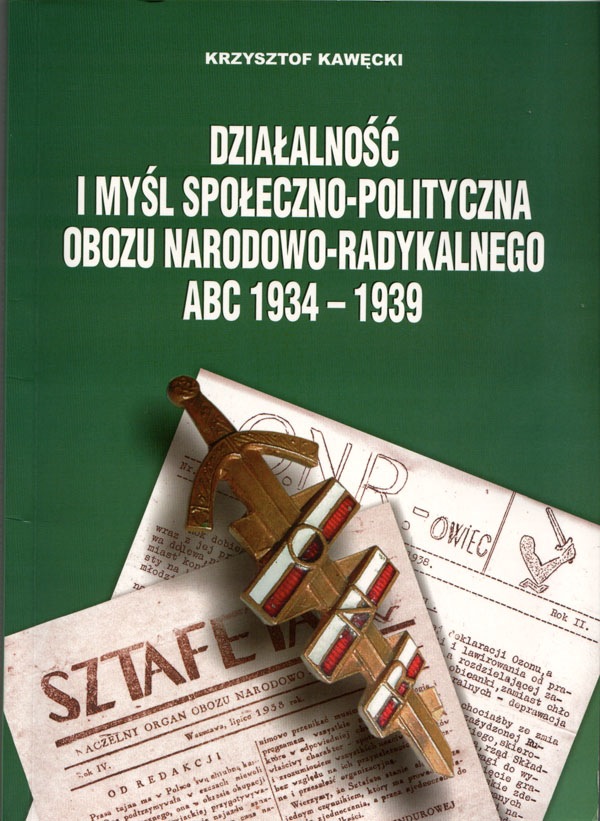ONR Not Unilaterally AntiMinority Kawecki

Dzialalnosc i Mysl Spoleczno-Polityczna Obozu Narodowego-Radykalnego ABC 1934-1939, by Krzysztof Kawecki. 2013
A Short Introduction to the Polish “Far-Right” ONR (Oboz Narodowo-Radykalne). In No Sense Fascist or Pro-Nazi, as Alleged by LEWAKS (Leftists) and Certain Jews. ONR Not a Monolith. Complex Relationships With Poland’s Minorities
THE SOCIO-POLITICAL THOUGHT AND POLICIES OF THE POLISH RADICAL NATIONAL CAMP ABC 1934-1939, is the title of this Polish-language work. I focus on a few major topics in my review:
RELATIONSHIP TO FASCISM AND NAZISM
The ONR’s detractors, notably the leftists and the Jews, have usually portrayed it as a form of Polish fascism, or imitation of Nazism. Nothing could be further from the truth. The ONR wanted a Poland that promoted Roman Catholic civilization, in opposition to the “two paganisms”—that of Nazi Germany and the Soviet Union. (p. 68).
Many years before WWII was even on the horizon, the Polish Right had completely repudiated Italian Fascism and German Nazism. For instance, an article in the 1934 SZTAFETA stressed the fact that the Polish nationalist movement wanted nothing to do with Fascism and Nazism, as both of the latter have many faults and many sins. In related publications, it was noted, already by the early-mid 1930’s, that Italian fascism had become beholden to big capitalism, and that Nazism had rejected basic Christian moral values. (p. 29).
JEWS AND THE POLISH POLITICAL RIGHT: AN INTRODUCTION
Kawecki’s work includes a section of photographs that follows p. 60. One of the photos is of the January 1938 issue of a newspaper, O.N.R.–OWIEC. It describes how wealthy Jews, such as the Fajgenbaums, are using bribes to buy their way out of military service. It also objects to Jews, in high places, that are Communists, and it faults Jews who use their influence on radio to promote untruths and to defame Poland. (Sound familiar?)
In 1934, a group of rabbis visited Cardinal Aleksander Kakowski, and called on him to condemn the ONR in sermons throughout Poland. He responded that he was opposed to all excesses and violence, regardless of who engages in it. He also called attention to the Jewish insensitivity towards, and provocations directed against, Polish religious feelings and Catholic moral values. (p. 27). [Were there such courageous Polish religious leaders—today—willing to be so politically incorrect and to stand up for Poland!]
This work provides biographical information on leading ONR personages. This includes Tadeusz Gluzinski (nom de plume Henryk Rolicki), and one of his works, ZMIERZCH IZRAELA. (p. 60). Although the ONR in general, and Rolicki in particular, are usually considered very anti-Semitic, it turns out that this work was quite measured and moderate (especially for its time) in its critical analysis of Jewish conduct. Please see my English-language review of Zmierzch Izraela – by Tadeusz Gluzinski ps. Henryk Rolicki.
SEGREGATED SEATING WAS COMMON AT THE TIME
Now consider the infamous ghetto benches. They served to lessen the antagonisms between Polish and Jewish university students. In addition, the ghetto benches were supported not only by the likes of the ONR, but also Jewish-student Zionist organizations. (p. 56).
FREEING POLAND FROM JEWISH ECONOMIC HEGEMONY
The goals of radical Polish nationalists centered upon the emancipation of Poland from the centuries-old, self-perpetuating Jewish economic privileges. The policies included the short-term promotion of Polish businesses with the concomitant boycotting of Jewish economic establishments, and the long-term emigration of Jews. Otherwise, even the “extreme” Polish nationalist ideas were not monolithic. Thus, for instance, the OZN (Oboz Zjednoczenia Narodowego), unlike the ONR and SN, favored allowing the Jews to retain their political rights. (p. 83).
The boycotts of businesses were not limited to Jewish ones. German firms were also boycotted. (p. 58).
Far from engaging in the scapegoating of Jews, leading ONR thinkers realized that Poland’s economic problems went far beyond Jewish economic dominance, and were structural in nature. Various reform proposals were introduced. (pp. 74-75). This included the enhancement of industrial development in villages, which was to follow the removal of the Jews from commerce and industry. (p. 74).
THE UKRAINIAN PROBLEM
The Endeks in general, and the ONR in particular, are often branded as ethnonationalists. Whatever this left-wing buzzword is supposed to mean, the situation was not that simple. The ONR ABC did call for Poland’s Ukrainians and Belorussians to be assimilated to Polish civilization—but as “gente Ruthenus, natione Polonus”, (p. 85) evidently not a complete abandonment of prior self-identity in favor of complete Polonization. ONR thinker Wojciech Zaleski was even more moderate: He noted that Ukrainians are a nation of their own, and the Polish state must be based upon shared political ideals, and not upon shared Polish language. (p. 86).
FOR FURTHER STUDY
One feature of this work is its brevity. For more comprehensive analyses of the ONR, please read my detailed English-language reviews, of Duch mlodych and Polska dla Polakow! Kim Byli i Sa Polscy Narodowcy.
To see a series of truncated reviews in a Category click on that Category:
- All reviews
- Anti-Christian Tendencies
- Anti-Polish Trends
- Censorship on Poles and Jews
- Communization of Poland
- Cultural Marxism
- German Guilt Dilution
- Holocaust Industry
- Interwar Polish-Jewish Relations
- Jewish Collaboration
- Jewish Economic Dominance
- Jews Antagonize Poland
- Jews Not Faultless
- Jews' Holocaust Dominates
- Jews' Holocaust Non-Special
- Nazi Crimes and Communist Crimes Were Equal
- Opinion-Forming Anti-Polonism
- Pogrom Mongering
- Poland in World War II
- Polish Jew-Rescue Ingratitude
- Polish Nationalism
- Polish Non-Complicity
- Polish-Ukrainian Relations
- Polokaust
- Premodern Poland
- Recent Polish-Jewish Relations
- The Decadent West
- The Jew as Other
- Understanding Nazi Germany
- Why Jews a "Problem"
- Zydokomuna